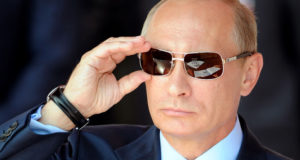5/30/2017
Is it appropriate for an ordinary American citizen to meet with Russian operatives and ask them to set up hidden communication channels with the Kremlin so that US intelligence can’t track the conversations? That is exactly what Jared Kushner tried to do in December, before Donald Trump took office in January.
Before Trump became President, and before Kushner had any authority or legal right to do so, Kushner met with Russian operative Sergey Kislyak in Trump Tower in an attempt to set up back-channel communications with the Russians, through Russian facilities. It is against US Federal law for an ordinary citizen to negotiate or transact business on behalf of the United States with a foreign government. Well after these meetings, while Kushner was applying for his security clearance he failed to mention these meetings with the Russians, just like he failed to mention his meeting with the head of a Russian bank which has direct ties to Vladimir Putin and Russian spy services.
Why would Kushner, or other future members of the Trump Administration, try to set up a secretive communication channel? What purpose would it serve? To whom’s advantage was it, and why did they feel a need to keep their conversations from other US officials? Nobody in the White House has answered those questions yet.
Trump’s Homeland Security Secretary John Kelly appeared on both ABC News’ “This Week”, and NBC’s “Meet the Press” and gave this assessment of Kushner’s reported outreach to Russia:
“It’s both normal, in my opinion, and acceptable. Any way that you can communicate with people, particularly organizations that are maybe not particularly friendly to us is a good thing…. [I]t’s not a bad thing to have multiple communication lines to any government.”
However Republican Senator John McCain, when asked what he thought of the news regarding Kushner stated “I don’t like it”. “I know that some administration officials are saying ‘well, that’s standard procedure.’ I don’t think it’s standard procedure prior to the inauguration of the president of the United States by someone who is not in an appointed position.”
Furthermore, Michael McFaul, the former U.S. ambassador to Russia, was asked where something like this falls “on a scale of ‘always’ to ‘never.’” McFaul responded, “Never. I’ve never heard of anybody asking to come to our embassy from Russia to communicate with people back here in the United States, or vice versa.”
Tweet




